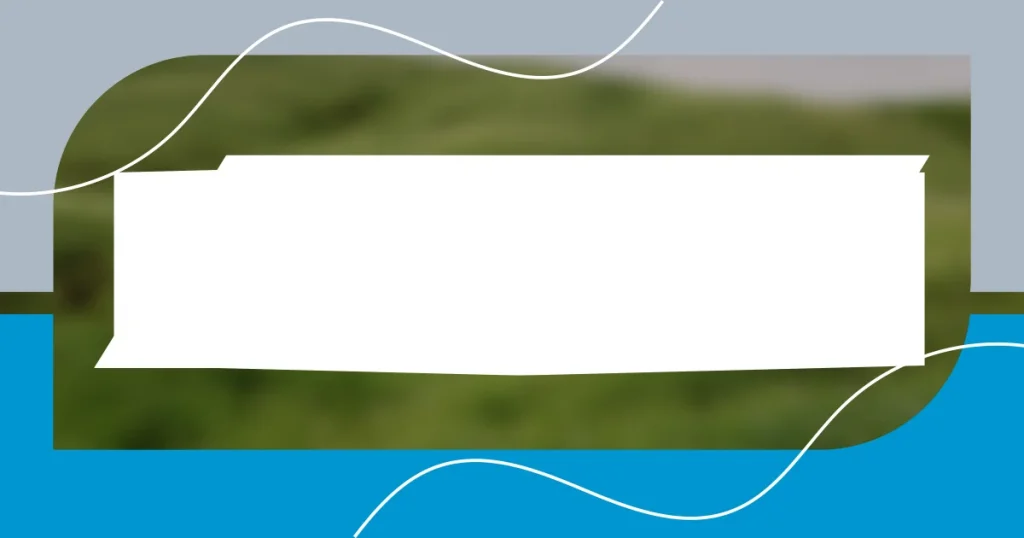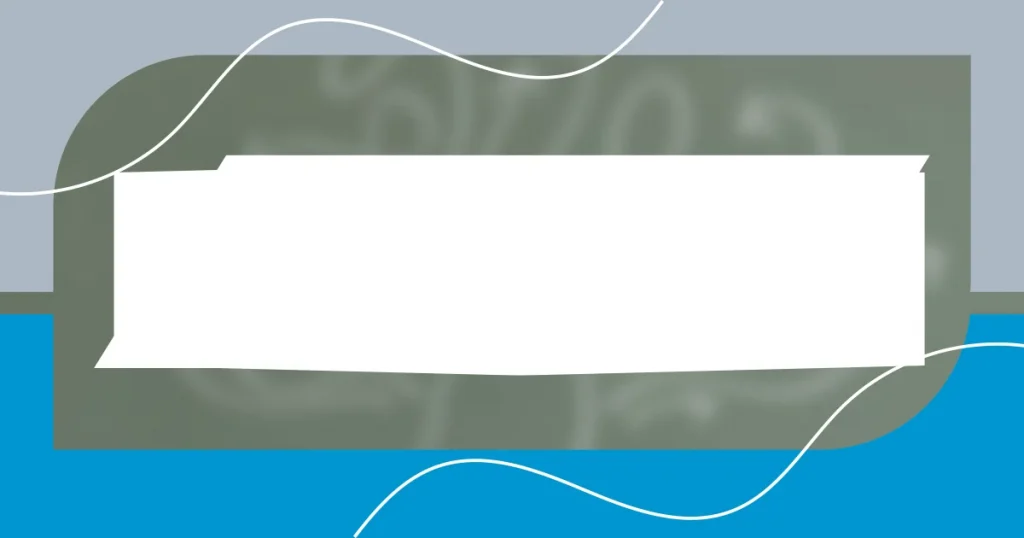Key takeaways:
- Environmental non-fiction merges storytelling with advocacy, urging readers to reflect on their relationship with nature and inspiring action to combat ecological issues.
- Key themes include the connection between humanity and nature, the urgency of climate action, and the hope and resilience exhibited by communities working for environmental restoration.
- Notable authors like Rachel Carson, Bill McKibben, and Elizabeth Kolbert have significantly shaped the genre, using personal narratives and scientific insights to engage readers on pressing environmental concerns.

Understanding Environmental Non-Fiction
Environmental non-fiction is a powerful genre that marries storytelling with advocacy. I remember the first time I picked up a book like this, feeling a jolt of awareness as the author painted vivid images of devastated landscapes and thriving ecosystems. Isn’t it amazing how words can ignite passion for the planet and spark a desire for change?
This genre often draws on real-life experiences and scientific data to weave compelling narratives. As I delve into these stories, I find myself reflecting on my own interactions with nature—like the awe I felt hiking through a vibrant forest or the sadness I experienced seeing litter on a beach. Those moments enable me to grasp the urgency of the issues discussed and remind me that these stories aren’t just facts; they are calls to action.
Many environmental non-fiction works challenge us to think critically about our consumption and its consequences. When reading about the impact of plastic pollution, I’ve often pondered my own habits, questioning how I can reduce my footprint. Have you ever considered how small changes in your daily life could lead to a greater impact? It’s a dialogue worth having, and these books can help facilitate that conversation.

Importance of Environmental Awareness
Understanding the importance of environmental awareness can’t be overstated. I’ve often found myself in a charming little park near my home, watching the seasons change and marvelling at nature’s resilience. However, during one visit, I noticed litter strewn across the grass, which made me realize just how fragile these beautiful spaces can be. This stark contrast serves as a potent reminder that our actions have direct consequences on our surroundings.
- Environmental awareness fosters a sense of responsibility, prompting individuals to consider their impact on the planet.
- It promotes sustainable practices, encouraging us to make choices that protect the environment for future generations.
- By cultivating awareness, we develop empathy towards all living beings, understanding that we’re part of a larger ecological community.
- Engaging with environmental issues can lead to stronger advocacy, empowering communities to unite in the pursuit of solutions.

Key Themes in Environmental Non-Fiction
I believe one of the most prominent themes in environmental non-fiction is the intersection between humanity and nature. It’s a profound realization I had while volunteering for a local cleanup drive. As we picked up trash from the shore, the connection between our lifestyles and the health of the ocean became crystal clear. It’s those heart-wrenching moments that reveal how our choices impact the delicate balance of ecosystems.
Another key theme is the urgency of climate action. I vividly recall reading a book that detailed the alarming changes in weather patterns and their implications. It struck a chord with me, reminding me of the summer storms that once brought joy but now cause destruction in my community. This theme resonates deeply, urging readers to take immediate steps towards sustainable living that can protect our planet for future generations.
Lastly, the theme of hope and resilience often emerges in these narratives. I was inspired by stories of communities coming together to restore their local environments, fighting against the odds. These tales remind us that despite the challenges we face, there are countless individuals dedicated to making a difference. They fuel my belief that collective action can lead to positive change, strengthening my resolve to contribute in my own way.
| Theme | Description |
|---|---|
| Humanity’s Connection to Nature | Explores the bond between our actions and the health of ecosystems, illustrated through personal experiences and community involvement. |
| Urgency of Climate Action | Highlights the immediate need for change in response to alarming environmental changes, calling readers to reflect on their lifestyles. |
| Hope and Resilience | Showcases stories of communities working towards environmental restoration, emphasizing the power of collective action. |

Notable Authors in the Genre
Exploring notable authors in environmental non-fiction, I can’t help but think of Rachel Carson. Her groundbreaking book, “Silent Spring,” sparked a revolution in environmental awareness, pushing the conversation about pesticide use into the public eye. I remember the first time I read her work; it was as if she reached out from the pages, urging us to reconsider our relationship with nature.
Then there’s Bill McKibben, whose writing often combines science and personal narrative in a captivating way. His book “The End of Nature” was one of the first to tackle climate change for a general audience. As I flipped through its pages, I felt that familiar knot in my stomach—how can we ignore such urgent facts? McKibben’s storytelling resonates with a sense of immediacy that inspires action among readers, pushing us to engage rather than stand by.
Finally, I must mention Elizabeth Kolbert, who brings environmental issues to life with a journalistic approach that’s both enlightening and alarming. “Field Notes from a Catastrophe” left me feeling a mix of urgency and hope as she chronicles the effects of global warming across the globe. I often find myself pondering: what will our world look like if we don’t heed her warnings? Kolbert’s narrative has a way of making complex scientific concepts relatable, sparking conversations that are crucial for our time.

How to Choose Environmental Books
When choosing environmental books, I always consider the author’s credibility and personal connection to the subject. For instance, I once picked up a book by an ecologist whose firsthand accounts of field research captivated me. It’s those real experiences that often breathe life into the words, making the message not just informative but deeply personal and relatable.
Another factor I weigh is the book’s engagement level. I’ve found that narratives that weave together storytelling with solid research are the ones that resonate most. While reading a compelling memoir about conservation efforts in the Amazon, I found myself emotionally invested, feeling both excitement and sadness throughout the journey. Does the book make you care? If so, it’s likely a great choice for anyone looking to explore environmental issues.
Lastly, I recommend checking out reviews and summaries to see how others have reacted to the book. I remember feeling a bit overwhelmed by the sheer volume of titles out there, but reading various perspectives helped narrow my options. It’s often striking how personal insights from other readers can mirror your own feelings and guide you towards meaningful choices in environmental literature.

Critical Reception of Environmental Works
Critical reception of environmental works can vary widely, often reflecting both the urgency of the subject matter and the emotional weight these books carry. I vividly recall the mixed reviews surrounding Paul Kingsnorth’s “Confessions of a Recovering Environmentalist.” Some praised his candidness in confronting the emotional turmoil tied to modern environmentalism, while others criticized him for what felt like defeatism. When I read it, I found the book stirred a deep sense of reflection in me, pushing me to grapple with the complexity of hope and despair in the face of ecological collapse.
Many authors, like Kolbert and Carson, have managed to capture the public’s imagination and critical acclaim, often becoming foundational texts in environmental literature. However, it’s fascinating how some of these works are still met with skepticism from certain circles, particularly those resistant to acknowledging climate change. I remember participating in an online discussion where one participant dismissed Carson’s warnings as overblown. This polarization can be frustrating, yet it highlights the necessity for engaging, well-crafted narratives that bridge the gap between scientific data and emotional resonance.
Ultimately, the critical reception of these books can indicate broader societal attitudes towards environmental issues. For example, when I read the reviews of contemporary works like “This Changes Everything” by Naomi Klein, I was struck by the division between apathy and activism in the responses. It got me thinking: how do our emotional reactions to these texts shape our willingness to take action? The dialogue surrounding these works continues to evolve, reminding us that literature has the power not just to inform, but to inspire collective change.

Personal Reflections on Reading
Reading environmental non-fiction has often felt like embarking on an emotional journey for me. I remember devouring “Silent Spring” by Rachel Carson one rainy afternoon, the pages nearly soaked with my tears as I absorbed her poignant warnings. It was a moment when I realized that books could transcend mere facts; they could tug at our hearts and awaken a sense of urgency that often feels dormant in our daily lives.
I also reflect on the times I’ve read works that challenge my perspectives. For instance, confronting the harsh realities presented in “The Uninhabitable Earth” by David Wallace-Wells left me gasping. It wasn’t just the information—it was the visceral feeling of fear and responsibility that washed over me. Have you ever felt that jarring wake-up call in a book? Those moments force me to reconsider my own habits and responsibilities regarding our planet.
Engaging with these texts often feels like a dialogue with the authors themselves. I find myself nodding along or shaking my head in disagreement, and those layers of interaction enrich my reading experience. The next time you pick up an environmental book, take a moment to pause and reflect: what emotions are emerging for you, and how might they influence your actions in the real world? That connection can be profoundly motivating.














